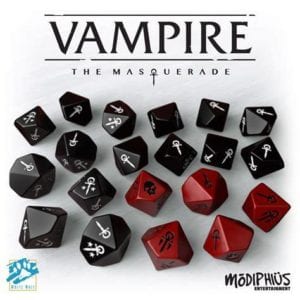It’s a bad night to be a vampire; it’s a great night to play a vampire. Vampire the Masquerade V5 is not a reboot, it’s a continuation of the Vampire storyline within the World of Darkness. These nights, the human world poses more of a threat to vampire survival than the other way around. The gameplay mechanics have changed to reflect that tension, while allowing for more of a narrative driven story.
So let’s take a look at the biggest changes seen in the new edition of Vampire the Masquerade:
The Second Inquisition
Our world has changed, and the World of Darkness has changed with it. Gone are the days of waking up, dead, and being able to go by a new name in a new town. We have cameras now, everywhere. They’re in the pockets of every possible meal. Those cameras come with facial recognition software. Someone is going to know if your face shows up but you’re dead. That someone is The Second Inquisition.
The Second Inquisition is the Big Brother vampires we never thought to fear. Major intelligence agencies around the globe have discovered the existence of “blank bodies”: individuals who do not show up on a body scan. What does this mean for players? First and foremost, your vampire character should avoid the internet. And cameras. And flying. Be wary of who you trust and ally yourself with. The Second Inquisition are not the only ones watching.
The Beckoning
Vampiric society is hierarchical. The older you are, the more powerful you are. V5 allows for players to create characters between the 10th and 16th generations. The Elders, those of the 6th-9th generations, are experiencing something they call “The Beckoning.” We just established that you won’t be playing an Elder, so what does this matter to you as a player?
The Beckoning is calling those vampires of the 9th generation and older away to the Middle East. This means that the leadership of most of the vampire society is leaving. Younger vampires have the opportunity to move up in the world. Not only has this changed the politics of the vampire world—the Camarilla and the Anarchs are no longer at peace—but it means even the Thin-bloods can find a place in the night.
Story Over Dice

One of the goals of the developers for V5 was to prioritize the story over the rules of the game. The core rulebook is filled with suggestions on ways to enjoy more narrative driven sessions. These suggestions are based around the idea of pacing. Does rolling dice add to the tension or take away from it? That decision can be made scene to scene or session by session.
The rules of the dice themselves have changed as well. Vampire is still a d10 system, but the mechanics have been streamlined. Successes are now determined by a 6 or above for all rolls, instead of looking for a target number. Combat requires one roll per engagement, and that could be social or physical.
The Hunger
One set of dice, however, are more important. Hunger dice in V5 supply a constant threat. Narratively, these dice represent not only how badly a vampire needs blood, but they also dictate the will of The Beast—the personification of the feral hunger at the heart of vampiric existence. The higher a vampire’s Hunger, the more of their dice pool becomes hunger dice. These dice carry the threat of messy critical and bestial failures.
Normally, a critical success is the best type of roll a player can see. However, if the critical is scored due to a player’s hunger dice, it becomes messy. The goal of the roll is still achieved, but it is achieved by a monster. Bestial failures are even worse: you fail at your objective and you still make a mess. In the age of The Second Inquisition, these messes need to be dealt with, and quickly.
Tensions are running high for vampires everywhere, but as players that just adds to the excitement. Will you play as a Camarilla agent desperately seeking to protect the Masquerade? A Thin-blood vampire seeking a way up in their new nightly world? Or maybe an Anarch seeking to embrace this new reality? The night is yours to explore.
Images Courtesy of White Wolf
Have strong thoughts about this piece you need to share? Or maybe there’s something else on your mind you’re wanting to talk about with fellow Fandomentals? Head on over to our Community server to join in the conversation!

